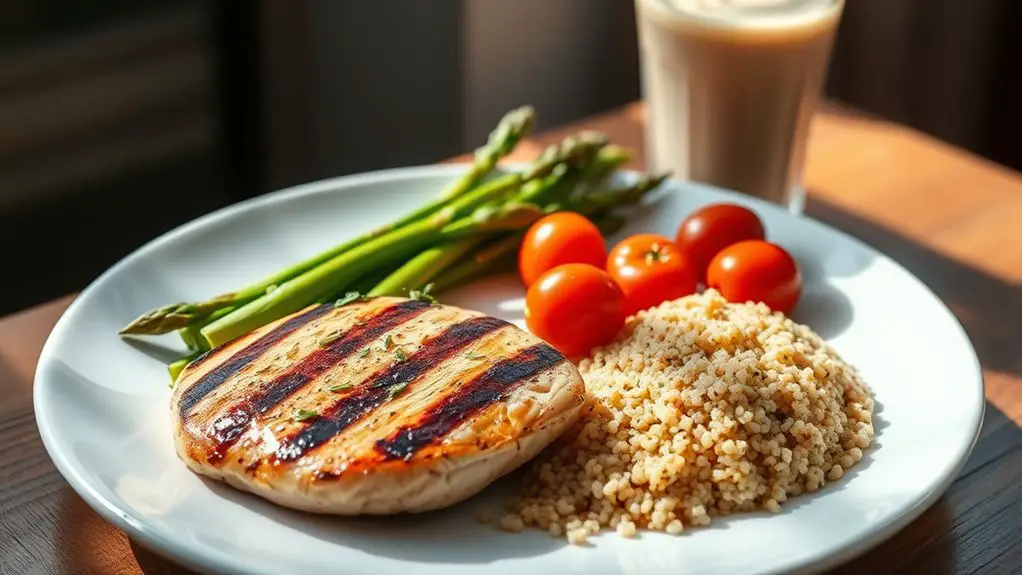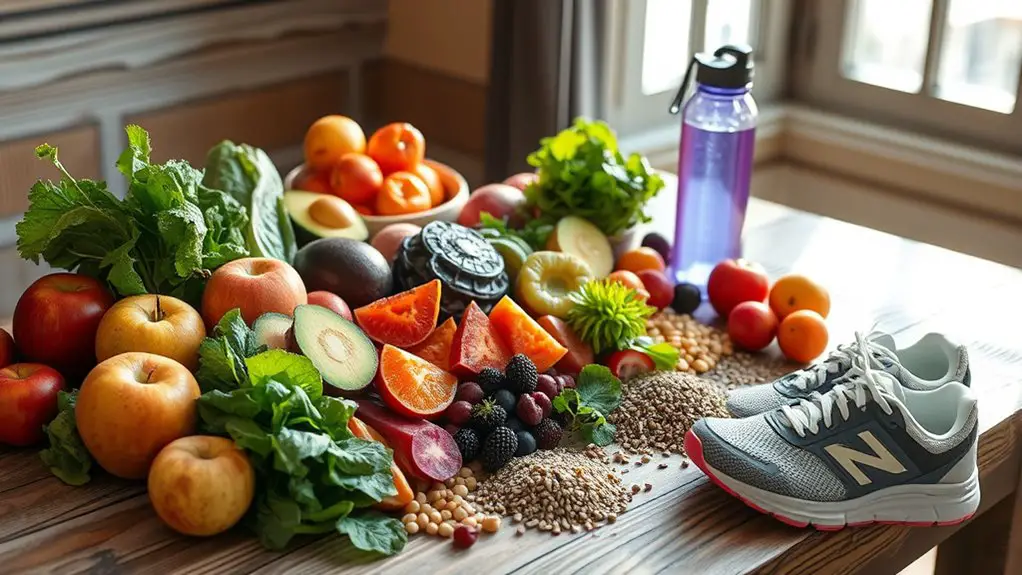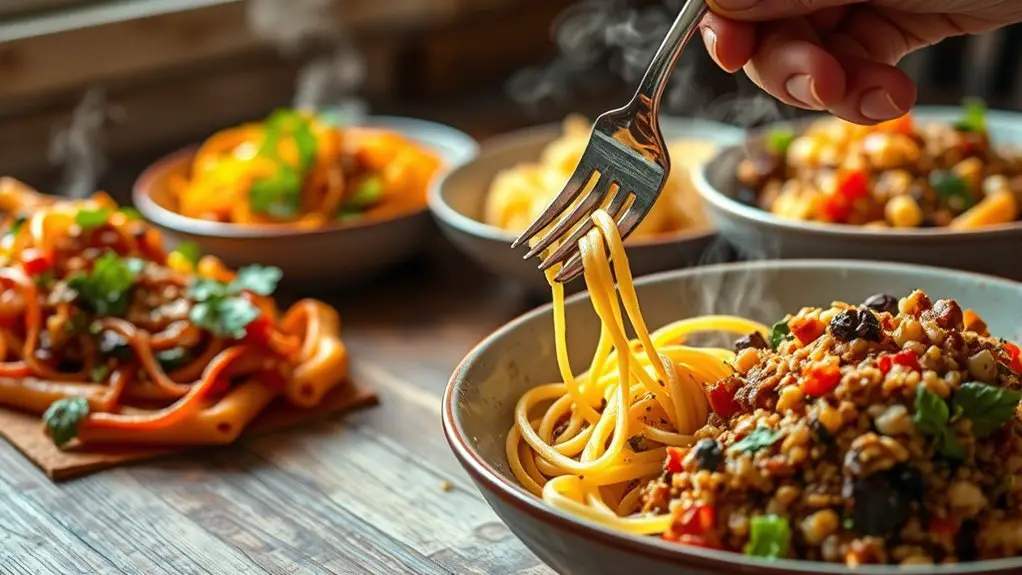To balance protein and carbs for lean muscle gains, aim for 1.2 to 2.2 grams of protein and 3 to 7 grams of carbs per kilogram of body weight. Include lean protein sources like chicken and fish, along with complex carbs from whole grains. Timing matters too—consume protein and carbs 1-2 hours before workouts and post-exercise for ideal recovery. With the right adjustments, you'll see progress in muscle growth and energy levels. There's even more to explore about this!
Understanding Protein and Carbohydrates
When you're looking to build muscle, understanding protein and carbohydrates is essential since both play important roles in your diet. Protein's often hailed as the muscle-building block, but don't overlook carbs. They're your body's primary energy source, fueling your workouts and recovery. Without adequate carbs, your energy levels can dip, making it tough to push through those challenging sets.
Think of protein and carbs as partners in your journey. While protein repairs and builds muscle, carbs replenish glycogen stores, ensuring you're ready for your next session. Ideally, you'll want to strike a balance that suits your individual needs, keeping in mind your activity levels and personal goals. Proper nourishment enhances recovery and boosts performance, making it crucial to incorporate both macronutrients effectively.
Don't shy away from wholesome sources of both. Whole grains, fruits, and vegetables can provide the carbs you need, while lean meats, legumes, and dairy can offer high-quality protein. Embrace this balance to reveal your true potential and enjoy the freedom to perform at your best!
The Role of Protein in Muscle Growth
Protein plays an essential role in muscle growth, acting as the foundation for building and repairing tissue after intense workouts. When you push your limits, your muscles endure stress, leading to tiny tears that need to heal. This is where protein steps in. By providing the amino acids necessary for recovery, it helps your muscles rebuild stronger and more resilient.
To maximize your gains, you need to consume enough protein regularly. Aim for a balance that aligns with your activity level and goals. Whether you're a weightlifter or an avid runner, incorporating high-quality protein sources like lean meats, fish, and plant-based options can make a significant difference in your progress. Additionally, adequate protein intake reduces soreness and accelerates recovery time, enhancing your performance in subsequent workouts.
Don't forget to time your protein intake around your workouts for best results. By fueling your body with the right nutrients, you empower yourself to chase your fitness goals and enjoy the freedom that comes with increased strength and endurance.
The Importance of Carbohydrates for Energy
Carbohydrates are essential for fueling your workouts and maximizing performance. They're stored as glycogen in your muscles, providing the energy you need during intense training sessions and aiding in recovery afterward. Timing your carb intake can make all the difference in achieving your fitness goals. Understanding metabolism helps you optimize the way your body utilizes these vital nutrients for enhanced athletic performance.
Energy Source for Workouts
Energy is the fuel that powers your workouts, and carbohydrates play an essential role in providing that energy. When you're pushing your limits, your body craves quick-burning fuel, and that's where carbs come in. They break down into glucose, which your muscles use during high-intensity training. Without enough carbs, you might feel sluggish, and your performance could suffer, limiting your freedom to push harder and achieve your goals.
Incorporating the right amount of carbohydrates into your diet guarantees you've got the energy to tackle intense workouts and recover afterward. It's all about striking that balance—fueling your body so you can lift, sprint, or cycle without feeling drained. Embrace the power of carbs, and release your potential in every session!
Glycogen Storage and Recovery
After understanding how carbs fuel your workouts, it's important to recognize their role in glycogen storage and recovery. Carbohydrates replenish glycogen stores, which are essential for maintaining your energy levels during intense training. When you prioritize carbs, you enhance your muscle recovery, enabling you to push harder in your next session.
Here's a quick reference table to illustrate the types of carbs and their benefits:
| Type of Carbohydrate | Source | Recovery Benefit |
|---|---|---|
| Simple | Fruits | Quick energy boost |
| Complex | Whole grains | Sustained energy release |
| Fiber | Vegetables | Digestive health |
| Starchy | Potatoes | Glycogen replenishment |
| Sugars | Honey | Fast recovery |
Embrace carbs to fuel your freedom in training!
Timing Carbs for Performance
While you might focus on overall nutrition, timing your carbohydrate intake can greatly impact your performance. To release your full potential, consider fueling up with carbs before workouts. This gives your body the energy it needs to power through intense sessions. After exercising, it's essential to replenish your glycogen stores with carbs and protein. This combo not only aids recovery but also helps build lean muscle. Don't shy away from quick-digesting carbs like fruit or rice cakes right after your workout; they can expedite recovery. Remember, it's not just about what you eat, but when you eat it. By mastering your carb timing, you'll feel more energized, perform better, and achieve those muscle gains you're after.
Optimal Protein and Carb Ratios for Muscle Gains
Finding the right balance between protein and carbohydrates is essential for maximizing muscle gains. You'll want to aim for a protein-to-carb ratio that suits your individual goals and lifestyle. A common guideline is to consume about 1.2 to 2.2 grams of protein per kilogram of body weight, while keeping your carbs around 3 to 7 grams per kilogram, depending on your activity level.
If you're pushing hard in the gym, closer to that higher carb intake can help fuel your workouts and recovery. But if you're more focused on fat loss while maintaining muscle, you might favor a higher protein ratio. Ultimately, find what feels right for you. Listen to your body—it's your ultimate guide. Adjust these ratios based on how you feel and your progress. Remember, it's all about freedom in your choices while building a physique you can be proud of. Additionally, proper hydration plays a key role in maintaining energy levels and enhancing performance during workouts.
Timing Your Protein and Carb Intake
When should you be timing your protein and carb intake for ideal muscle gains? The answer lies in your workout schedule. Consuming protein and carbs before and after your workouts can greatly enhance your muscle recovery and growth. Aim to have a balanced meal or snack about 1-2 hours before exercising. This'll fuel your workout and help maintain energy levels.
Post-workout, your body craves nutrients. Try to eat a meal rich in protein and carbs within 30-60 minutes after finishing your session. This timing helps replenish glycogen stores and kickstarts muscle repair. Additionally, focusing on macronutrient balance ensures your meals effectively support your fitness goals.
If you're on the go, don't stress! Quick options like protein shakes or bars paired with fruit can work wonders. Just remember, the key is to listen to your body and adjust your intake based on how you feel. With the right timing, you'll set yourself up for those lean muscle gains you're aiming for!
Sample Meal Plans for Balancing Protein and Carbs
To achieve peak muscle gains, it is essential to have a meal plan that effectively balances protein and carbs throughout the day. Start your morning with scrambled eggs and whole-grain toast for a solid protein-carb combo. For lunch, consider grilled chicken with quinoa and steamed veggies; this keeps your energy up without weighing you down.
In the afternoon, a protein shake blended with a banana can provide a quick pick-me-up. Dinner could be baked salmon with brown rice and asparagus, offering healthy fats alongside your protein and carbs. Proper fueling enhances performance and energy levels, making your workouts more effective.
Don't forget snacks! Greek yogurt with berries is a fantastic choice. Throughout the day, aim for a ratio of about 30% protein to 70% carbs to fuel your workouts and recovery. With these meal ideas, you'll not only enjoy your food but also nourish your body for those lean muscle gains you're after.
Frequently Asked Questions
Can I Gain Muscle on a Vegetarian or Vegan Diet?
Absolutely, you can gain muscle on a vegetarian or vegan diet! It's all about incorporating enough plant-based proteins and balanced nutrients. Focus on whole foods, variety, and adequate calories to support your muscle-building goals.
How Do I Adjust My Diet for Different Workout Intensities?
Think of your diet as a canvas; adjust your nutrient colors based on workout intensity. For high-energy days, enrich with carbs, while on lighter days, focus on protein. Your body's rhythm will flourish with this balance.
Are Protein Supplements Necessary for Muscle Growth?
Protein supplements aren't necessary for muscle growth if you're getting enough protein from whole foods. Focus on a balanced diet, and if you struggle to meet your needs, then consider supplements as a convenient option.
What Are the Best Sources of Complex Carbohydrates?
When you're looking for the best sources of complex carbohydrates, think whole grains, legumes, fruits, and vegetables. They'll provide sustained energy and essential nutrients, helping you feel free and fueled for all your activities.
How Can I Measure My Macronutrient Intake Accurately?
Think of your body as a finely-tuned machine; to measure your macronutrient intake accurately, track everything you eat with apps or a journal. You'll gain freedom in understanding what fuels your fitness journey!




